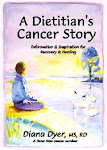A report out today is calling for "whole cancer care", ie., treating the "whole person", not just the tumor(s). This report (linked to the title of this posting) focuses on the psycho-social needs of patients after hearing those chilling, mind-numbing words "You have cancer", needs that address the paralyzing fears, the depression, the overwhelming tangle of logistics involved to even show up for appointments, etc, etc. Basically, the report is calling for the oncology community to be aware of these needs as a part of true comprehensive cancer care in every single patient, screening for these needs, and solving the identified problems or making referrals to appropriate health care professionals who can adequately address these very real concerns.
This is not a new concept, in fact most cancer centers do have a social worker and/or psychologist on staff to help with these very common problems. However, I know that most cancer centers are inadequately staffed in these areas (patients are often only referred after huge problems are identified) and that these staff members know deep in their hearts that they are only able to help the tip of the iceberg of patients who could benefit from their expertise.
In addition, the vast majority of patients in this country are not receiving cancer care at comprehensive cancer care centers and are getting their therapies in small centers or individual doctors' offices that may not have any social workers and therapists on staff at all.
And of course all this is simply part of the bigger picture where only some patients are fortunate enough to be receiving cancer care where a Registered Dietitian (RD) is a member of their multi-disciplinary team, too.
Don't underestimate grass-roots efforts (i.e., yours!) at bringing about the changes you want to see in your own cancer care and at your own cancer treatment facility. I am aware of cancer centers around the country who only have an RD on staff because of demands (yes, demands!) by the patients. I am also aware of patients who have chosen where they received their cancer care on the basis of whether or not a cancer center integrated nutrition into cancer care and had an RD as part of the oncology team. (yes, that is true!) Remember the business rule of thumb: "what the customer wants, the customer gets" and that you are the customer in the situation that involves your health. Don't be afraid to be "the squeaky wheel".
For some reason, I am remembering a quotation by Thomas Jefferson that I saw this morning on a dinner plate, of all things:
"A little rebellion now and then is a good thing"
I am smiling as I am thinking about this, smiling because I think of what all has changed in the cancer survivor community over the past decade, knowing that all the changes seen (including this report today raising awareness of the enormous unmet emotional, mental, social needs of cancer patients) would not have come about without someone taking a deep breath and publicly sticking their neck out and shaking up the status quo with a "little rebellion".
I applaud all the health care professionals who are going above and beyond the basics of their job descriptions by working to help patients keep their life as whole as possible after a cancer diagnosis. I also applaud all the patients and caregivers who are also going above and beyond getting through the difficulties of their own situation to ultimately help make the cancer survivorship journey for those that follow to be less difficult than their own has been (never easy, just less difficult).
If any of my readers have participated in (or even started!) a "little rebellion" of their own that has helped improve cancer care for the "whole patient", I thank you from the bottom of my heart. Please feel free to share it in the comments (you can do it anonymously if you wish). I just love success stories and would love to hear about yours. :-)
Diana Dyer, MS, RD
Wednesday, October 24, 2007
Subscribe to:
Post Comments (Atom)


2 comments:
This is a great blog. Just found it tonight. Thank you for sharing your time, effort and knowledge. I did just post a little rebellion piece today. Would love your response. Warmly, Jill
Dear Diana,
I found your blog from The Slow Cook. Then I realized that I have your book! This is my story:
I'm a very healthy, two-time survivor of cancer – bone and then breast cancer. Doctors gave me little hope after I'd been through all the traditional medical treatments. So I gave the macrobiotic diet a try. And ... I believe it has saved my life.
I am going to download your friends survey. Thank you...I will be back to visit!
Post a Comment